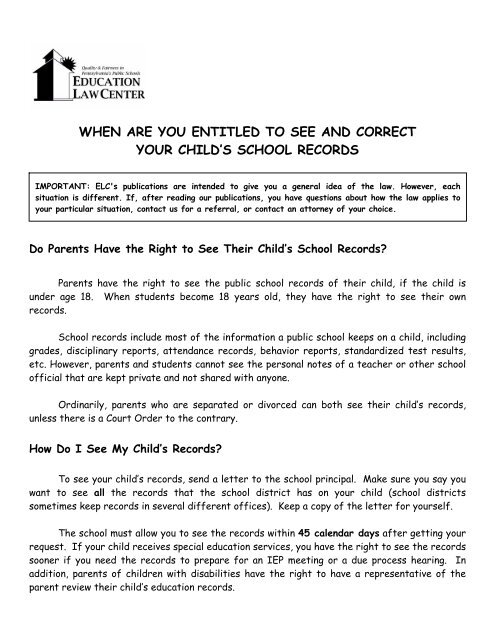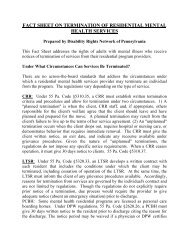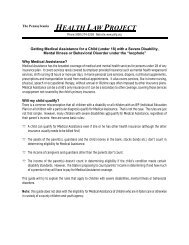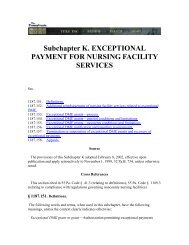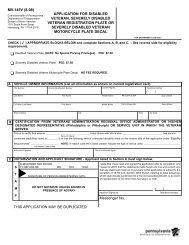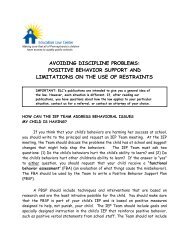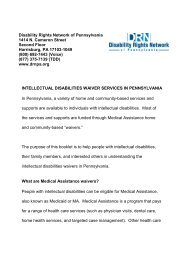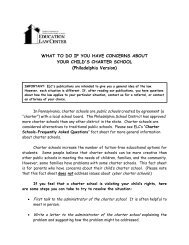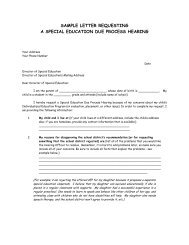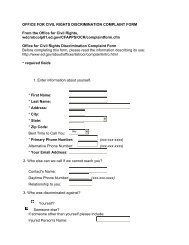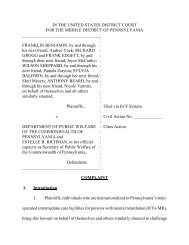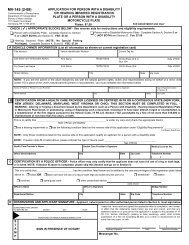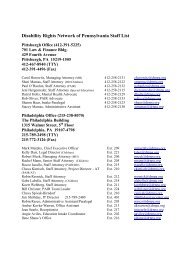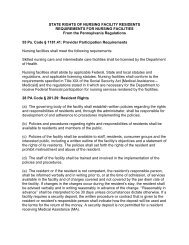when are you entitled to see and correct your child's school records
when are you entitled to see and correct your child's school records
when are you entitled to see and correct your child's school records
- No tags were found...
You also want an ePaper? Increase the reach of your titles
YUMPU automatically turns print PDFs into web optimized ePapers that Google loves.
WHEN ARE YOU ENTITLED TO SEE AND CORRECTYOUR CHILD’S SCHOOL RECORDSIMPORTANT: ELC's publications <strong>are</strong> intended <strong>to</strong> give <strong>you</strong> a general idea of the law. However, eachsituation is different. If, after reading our publications, <strong>you</strong> have questions about how the law applies <strong>to</strong><strong>you</strong>r particular situation, contact us for a referral, or contact an at<strong>to</strong>rney of <strong>you</strong>r choice.Do P<strong>are</strong>nts Have the Right <strong>to</strong> See Their Child’s School Records?P<strong>are</strong>nts have the right <strong>to</strong> <strong>see</strong> the public <strong>school</strong> <strong>records</strong> of their child, if the child isunder age 18. When students become 18 years old, they have the right <strong>to</strong> <strong>see</strong> their own<strong>records</strong>.School <strong>records</strong> include most of the information a public <strong>school</strong> keeps on a child, includinggrades, disciplinary reports, attendance <strong>records</strong>, behavior reports, st<strong>and</strong>ardized test results,etc. However, p<strong>are</strong>nts <strong>and</strong> students cannot <strong>see</strong> the personal notes of a teacher or other <strong>school</strong>official that <strong>are</strong> kept private <strong>and</strong> not sh<strong>are</strong>d with anyone.Ordinarily, p<strong>are</strong>nts who <strong>are</strong> separated or divorced can both <strong>see</strong> their child’s <strong>records</strong>,unless there is a Court Order <strong>to</strong> the contrary.How Do I See My Child’s Records?To <strong>see</strong> <strong>you</strong>r child’s <strong>records</strong>, send a letter <strong>to</strong> the <strong>school</strong> principal. Make sure <strong>you</strong> say <strong>you</strong>want <strong>to</strong> <strong>see</strong> all the <strong>records</strong> that the <strong>school</strong> district has on <strong>you</strong>r child (<strong>school</strong> districtssometimes keep <strong>records</strong> in several different offices). Keep a copy of the letter for <strong>you</strong>rself.The <strong>school</strong> must allow <strong>you</strong> <strong>to</strong> <strong>see</strong> the <strong>records</strong> within 45 calendar days after getting <strong>you</strong>rrequest. If <strong>you</strong>r child receives special education services, <strong>you</strong> have the right <strong>to</strong> <strong>see</strong> the <strong>records</strong>sooner if <strong>you</strong> need the <strong>records</strong> <strong>to</strong> prep<strong>are</strong> for an IEP meeting or a due process hearing. Inaddition, p<strong>are</strong>nts of children with disabilities have the right <strong>to</strong> have a representative of thep<strong>are</strong>nt review their child’s education <strong>records</strong>.
Can I Get Copies of the Records?You have the right <strong>to</strong> “inspect <strong>and</strong> review” <strong>you</strong>r child’s education <strong>records</strong>, although <strong>you</strong>do not have an absolute right <strong>to</strong> get copies of <strong>you</strong>r child’s <strong>records</strong>. However, <strong>school</strong>s usuallycomply with the law that allows p<strong>are</strong>nts the right <strong>to</strong> “inspect <strong>and</strong> review” <strong>records</strong> by givingp<strong>are</strong>nts a copy of the <strong>records</strong>. Schools <strong>are</strong> required <strong>to</strong> provide copies of <strong>records</strong> if a failure <strong>to</strong>do so would effectively prevent the p<strong>are</strong>nt (or eligible student) from reviewing the <strong>records</strong>.(For example, a p<strong>are</strong>nt may be <strong>entitled</strong> <strong>to</strong> copies of the <strong>records</strong> if he or she is physicallydisabled <strong>and</strong> is unable <strong>to</strong> get <strong>to</strong> the <strong>school</strong> <strong>to</strong> review the <strong>records</strong> there). Schools may charge<strong>you</strong> a fee for making copies, but only for the actual cost of copying. School officials may notcharge <strong>you</strong> for finding the <strong>records</strong>. Many <strong>school</strong> districts provide p<strong>are</strong>nts one copy of theirchild’s <strong>records</strong> for free. If <strong>you</strong> want, a <strong>school</strong> official must go over the <strong>records</strong> with <strong>you</strong> <strong>to</strong>help <strong>you</strong> underst<strong>and</strong> them.If <strong>you</strong>r child is in special education, <strong>you</strong> have the right <strong>to</strong> get a copy of his or herEvaluation Report (ER) <strong>and</strong> Individualized Education Program (IEP). In addition, if <strong>you</strong> <strong>are</strong>preparing for a due process hearing, <strong>you</strong> have a right <strong>to</strong> get copies of any <strong>records</strong> that the<strong>school</strong> district might use as evidence at the hearing.Do P<strong>are</strong>nts Have the Right <strong>to</strong> Keep Their Child’s School Records Private?With some limited exceptions, the <strong>school</strong> must get <strong>you</strong>r written consent before it canrelease any part of <strong>you</strong>r child’s <strong>records</strong> <strong>to</strong> someone outside the <strong>school</strong> system. However, <strong>you</strong>rconsent is not required before the <strong>school</strong> can send the <strong>records</strong> <strong>to</strong> another <strong>school</strong> system (orcollege) where <strong>you</strong>r child wants <strong>to</strong> enroll.Do P<strong>are</strong>nts Have the Right <strong>to</strong> Correct Their Child’s School Records?If <strong>you</strong> find that the <strong>records</strong> <strong>are</strong> inaccurate (for example, <strong>you</strong>r child’s <strong>records</strong> state thatshe received a B in English <strong>when</strong> the teacher <strong>to</strong>ld <strong>you</strong> she received an A) or misleading (forexample, the <strong>records</strong> omit a crucial fact about a disciplinary incident), or if <strong>you</strong> think theyviolate <strong>you</strong>r or <strong>you</strong>r <strong>child's</strong> privacy, <strong>you</strong> have the right <strong>to</strong> ask that the <strong>records</strong> be changed.Put <strong>you</strong>r request in writing <strong>and</strong> send it <strong>to</strong> the <strong>school</strong> principal.If <strong>school</strong> officials do not agree with <strong>you</strong>, <strong>you</strong> have the right <strong>to</strong> ask for a hearing <strong>to</strong> showwhy the <strong>records</strong> should be changed. An employee of the <strong>school</strong> district can conduct thehearing, as long as the hearing officer does not have a “direct interest” in the outcome of thehearing. For example, the hearing officer shouldn’t be the teacher whom the p<strong>are</strong>nts <strong>are</strong>arguing wrote up a misleading disciplinary report about their child. The <strong>school</strong> district mustissue a written decision on the issues presented at the hearing. Even if <strong>you</strong> lose at thehearing, <strong>you</strong> have the right <strong>to</strong> put a written statement in <strong>you</strong>r child’s <strong>records</strong> explaining
<strong>you</strong>r objections.What If School Officials Don’t Follow These Rules?You have the right <strong>to</strong> file a complaint with the federal government if the laws <strong>are</strong> notfollowed. Just send a letter explaining the problem <strong>to</strong>:Family Policy Compliance OfficeU.S. Dept. of Education400 Maryl<strong>and</strong> Ave., SWWashing<strong>to</strong>n D.C. 20202-4605Complaints must be filed within 180 days of the <strong>school</strong>’s violation of these rules or within 180days of the time <strong>you</strong> learned that <strong>school</strong> officials violated these rules.If <strong>you</strong>r child is in special education, <strong>you</strong> can also file a complaint with the:Division of Compliance,Planning & Moni<strong>to</strong>ring,Bureau of Special Education,333 Market Street,Harrisburg, PA 17126-0333More information about the federal law governing education <strong>records</strong> (called the FamilyEducational Rights <strong>and</strong> Privacy Act) can be found athttp://www.ed.gov/offices/OM/fpco/ferpalist.html.Funding for this brochure was provided, in part, by the Disability Rights Network of Pennsylvania(DRN), pursuant <strong>to</strong> the Developmentally Disabled Assistance <strong>and</strong> Bill of Rights Act, P.L. 101-496,<strong>and</strong> the P&A for Mentally Ill Individuals Act, P.L. 99-319. DRN is located at 1414 N. CameronStreet, Suite C, Harrisburg, PA 17103. Telephone: 800-692-7443 or 717-236-8110. Website:www.drnpa.org.Prep<strong>are</strong>d by: Education Law Center (Rev. 8/07)(215) 238-6970 (Philadelphia)(412) 258-2120 (Pittsburgh)www.elc-pa.org


